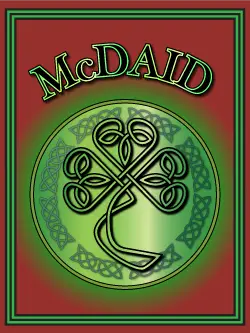McDaid is an Irish surname that is also popular in Scotland. There are several variations of the name including Davison, MacDavitt, McDade, McDavid, McDevitt and many others.
It comes from the old Gaelic surname ‘MacDaibheid’. MacDaibheid is made up of the prefix ‘Mac’ which means ‘son of’ and ‘Daibheid’ which was the Gaelic version of the name ‘David.’
Daibheid is a Hebrew name but it was reasonably well used in Ireland. However, it is unknown how or why a Hebrew name became popular in a non-Jewish country.
The name is most popular in the northern counties of Donegal and Derry, where McDaid and McDade are common variations.
Descended from David O’Doherty
It is possible that the ‘David’ who the family is named after is the patron saint of Wales St David.
However, most scholars agree that the most likely origin was a man called David O’Doherty.
O’Doherty was the chief of Cinel Conaill, which was a dynasty of the Northern Uí Néill. The dynasty is named after Conall Gulban who was the son of the famous Niall of the Nine Hostages. It is therefore possible that the McDaids are distant relatives of the O’Neills and the O’Dohertys.
Although David O’Doherty was chief of an Uí Néill dynasty, it didn’t mean that he didn’t have conflicts with other factions of the Uí Néill. He was killed by the Uí Néills in a 1208 battle at Inishowen, Ireland.
The name is still popular in Inishowen as well as the Scottish city of Glasgow.
Split from the main O’Doherty line
In the early 13th century the MacDaibheids separated from the main O’Doherty line. However, they are likely to have continued to serve the O’Doherty chieftains in various capacities over the centuries.
The McDaids remained a prominent family in their own right. A group of brothers – Hugh Boy, Phelim Reagh, Eamonn Gruama and Shane Crone – served Seán Óg O’Doherty who was a powerful chieftain during the 1590s.
It was their job to rear the Chieftain’s son who was heir to Cahir O’Doherty – the last Gaelic Lord of Inishowen.
Battles against and alongside the English
Phelim Reagh also fought on the side of Red Hugh O’Donnell against the English during the Nine-Year-War.
In 1595, O’Donnell had planned an ambush of English soldiers near Sligo town. Phelim Reagh was to take part in the ambush but his horse became tired which left Phelim isolated and exposed.
As the English were being led into the trap, Phelim feared for his life. He fired his spear at the nearest English soldier who was Captain Martin the Commander of the English troops.
Phelim killed Martin and managed to escape. However, the English troops retreated and the planned ambush did not materialise much to the fury of Red Hugh O’Donnell.
It wasn’t the only time the McDaids had problems with Red Hugh. Six years later, the McDaid’s Chieftain Seán Óg O’Doherty died.
Red Hugh selected his cousin Phelim O’Doherty to take his place as lord of Inishowen. Phelim was Sean’s half-brother but the McDaids were furious.
They had spent years preparing Sean’s son Cahir O’Doherty for the role and Red Hugh had passed him over in favour of a relative of his own.
The McDaids responded by switching sides and declaring their support for the English in the Nine Year War. They joined the English garrison in Derry and eventually helped the English to win the war.
Then surname develops
During the 17th century, many people in Ireland found it necessary to anglicise their name. This was because Ireland was under British rule. The British were keen to eradicate all aspects of Irish culture and wanted the people in Ireland to become ‘British’.
This meant that English became the dominant language in Ireland and people with Gaelic names would change the spelling so that it made sense in the English language.
This often happened because when the English government collected taxes, the administrators were English and wrote down Irish people’s names in a spelling that they could understand in English.
It was also likely that people with Irish sounding names would find it more difficult to find work.
During this period many people with the name MacDaibheid would have changed it to McDaid or one of the many variations.
